- Home
- William Gibson
Hinterlands Page 2
Hinterlands Read online
Page 2
"Don't tell me about it. No expectations, right? Let's go in loose." I opened the hatch and took a breath of Heaven's air; it was like cool white wine. "Where's Charmian?"
He sighed, a soft gust of static. "Charmian should be in Clearing Five, taking care of a Chilean who's three days home, but she's not, because she heard you were coming. So she's waiting for you by the carp pond. Stubborn bitch," he added.
Charmian was flicking pebbles at the Chinese bighead carp. She had a cluster of white flowers tucked behind one ear, a wilted Marlboro behind the other. Her feet were bare and muddy, and she'd hacked the legs off her jump suit at midthigh. Her black hair was drawn back in a ponytail.
We'd met for the first time at a party out in one of the welding shops, drunken voices clanging in the hollow of the alloy sphere, homemade vodka in zero gravity. Someone had a bag of water for a chaser, squeezed out a double handful, and flipped it expertly into a rolling, floppy ball of surface tension. Old jokes about passing water. But I'm graceless in zero g. I put my hand through it when it came my way. Shook a thousand silvery little balls from my hair, batting at them, tumbling, and the woman beside me was laughing, turning slow somersaults, long, thin girl with black hair. She wore those baggy drawstring pants that tourists take home from Tsiolkovsky and a faded NASA T-shirt three sizes too big. A minute later she was telling me about hang-gliding with the teen tsiolniki and about how proud they'd been of the weak pot they grew in one of the corn canisters. I didn't realize she was another surrogate until Hiro clicked in to tell us the party was over. She moved in with me a week later.
"A minute, okay?" Hiro gritted his teeth, a horrible sound. "One. Uno." Then he was gone, off the circuit entirely, maybe not even listening.
"How's tricks in Clearing Five?" I squatted beside her and found some pebbles of my own.
"Not so hot. I had to get away from him for a while, shot him up with hypnotics. My translator told me you were on your way up." - She has the kind of Texas accent that makes ice sound like ass.
"Thought you spoke Spanish. Guy's Chilean, isn't he?" I tossed one of my pebbles into the pond.
"I speak Mexican. The culture vultures said he wouldn't like my accent. Good thing, too. I can't follow him when he talks fast." One of her pebbles followed mine, rings spreading on the surface as it sank. "Which is constantly," she added. A bighead swam over to see whether her pebble was good to eat. "He isn't going to make it." She wasn't looking at me. Her tone was perfectly neutral. "Little Jorge is definitely not making it.''
I chose the flattest of my pebbles and tried to skip it across the pond, but it sank. The less I knew about Chilean Jorge, the better. I knew he was a live one, one of the ten percent. Our DOA count runs at twenty percent. Suicide. Seventy percent of the meatshots are automatic candidates for Wards: the diaper cases, mumblers, totally gone. Charmian and I are surrogates for that final ten percent.
If the first ones to come back had only returned with seashells, I doubt that Heaven would be out here.
Heaven was built after a dead Frenchman returned with a twelve-centimeter ring of magnetically coded steel locked in his cold hand, black parody of the lucky kid who wins the free ride on the merry-go-round. We may never find out where or how he got it, but that ring was the Rosetta stone for cancer. So now it's cargo cult time for the human race. We can pick things up out there that we might not stumble across in research in a thousand years. Charmian says we're like those poor suckers on their island, who spend all their time building landing strips to make the big silver birds come back. Charmian says that contact with "superior" civilizations is something you don't wish on your worst enemy.
"Ever wonder how they thought this scam up, Toby?" She was squinting into the sunlight, east, down the length of our cylindrical country, horizonless and green. "They must've had all the heavies in, the shrink elite, scattered down a long slab of genuine imitation rosewood, standard Pentagon issue. Each one got a clean notepad and a brand-new pencil, specially sharpened for the occasion. Everybody was there: Freudians, Jungians, Adlerians, Skinner rat men, you name it. And every one of those bastards knew in his heart that it was time to play his best hand. As a profession, not just as representatives of a given faction. There they are, Western psychiatry incarnate. And nothing's happening! People are popping back off the Highway dead, or else they come back drooling, singing nursery rhymes. The live ones last about three days, won't say a goddamned thing, then shoot themselves or go catatonic." She took a small flashlight from her belt and casually cracked its plastic shell, extracting the parabolic reflector. "Kremlin's screaming. CIA's going nuts. And worst of all, the multinationals who want to back the show are getting cold feet. `Dead spacemen? No data? No deal, friends.' So they're getting nervous, all those supershrinks, until some flake, some grinning weirdo from Berkeley maybe, he says," and her drawl sank to parody stoned mellowness, " `Like, hey, why don't we just put these people into a real nice place with a lotta good dope and somebody they can really relate to, hey?' " She laughed, shook her head. She was using the reflector to light her cigarette, concentrating the sunlight. They don't give us matchs; fires screw up the oxygen carbon dioxide balance. A tiny curl of gray smoke twisted away from the white-hot focal point.
"Okay," Hiro said, "that's your minute." I checked my watch; it was more like three minutes.
"Good luck, baby," she said softly, pretending to be intent on her cigarette. "Godspeed."
The promise of pain. It's there each time. You know what will happen, but you don't know when, or exactly how. You try to hold on to them; you rock them in the dark. But if you brace for the pain, you can't function. That poem Hiro quotes, Teach us to care and not to care.
We're like intelligent houseflies wandering through an international airport; some of us actually manage to blunder onto flights to London or Rio, maybe even survive the trip and make it back. "Hey," say the other flies, "what's happening on the other side of that door? What do they know that we don't?" At the edge of the Highway every human language unravels in your hands except, perhaps, the language of the shaman, of the cabalist, the language of the mystic intent on mapping hierarchies of demons, angels, saints.
But the Highway is governed by rules, and we've learned a few of them. That gives us something to cling to.
Rule One: One entity per ride; no teams, no couples.
Rule Two: No artificial intelligences; whatever's Out there won't stop for a smart machine, at least not the kind we know how to build.
Rule Three: Recording instruments are a waste of space; they always come back blank.
Dozens of new schools of physics have sprung up in Saint Olga's wake, ever more bizarre and more elegant heresies, each one hoping to shoulder its way to the inside track. One by one, they all fall down. In the whispering quiet of Heaven's nights, you imagine you can hear the paradigms shatter, shards of theory tinkling into brilliant dust as the lifework of some corporate think tank is reduced to the tersest historical footnote, and all in the time it takes your damaged traveler to mutter some fragment in the dark. not Flies in an airport, hitching rides. Flies are advised to ask too many questions; flies are advised not to try for the Big Picture. Repeated attempts in that direction invariably lead to the slow, relentless flowering of paranoia, your mind projecting huge, dark patterns on the walls of night, patterns that have a way of solidifying, becoming madness, becoming religion. Smart flies stick with Black Box theory; Black Box is the sanctioned metaphor, the Highway remaining x in every sane equation. We aren't supposed to worry about what the Highway is, or who put it there. Instead, we concentrate on what we put into the Box and what we get back out of it. There are things we send down the Highway (a woman named Olga, her ship, so many more who've followed) and things that come to us (a madwoman, a seashell, artifacts, fragments of alien technologies). The Black Box theorists assure us that our primary concern is to optimize this exchange. We're out here to see that our species gets its money's worth. Still, certain things become increasingly
evident; one of them is that we aren't the only flies who've found their way into an airport. We've collected artifacts from at least half a dozen wildly divergent cultures. "More hicks," Charmian calls them. We're like pack rats in the hold of a freighter, trading little pretties with rats from other ports. Dreaming of the bright lights, the big city.
Keep it simple, a matter of In and Out. Leni Hofmannstahl: Out.
We staged the homecoming of Leni Hofmannstahl in Clearing Three, also known as Elysium. I crouched in a stand of meticulous reproductions of young vine maples and studied her ship. It had originally looked like a wingless dragonfly, a slender, ten-meter abdomen housing the reaction engine. Now, with the engine removed, it looked like a matte-white pupa, larval eye bulges stuffed with the traditional useless array of sensors and probes. It lay on a gentle rise in the center of the clearing, a specially designed hillock sculpted to support a variety of vessel formats. The newer boats are smaller, like Grand Prix washing machines, minimalist pods with no pretense to being exploratory vessels. Modules for meatshots.
"I don't like it," Hiro said. "I don't like this one. It doesn't feel right... ." He might have been talking to himself; he might almost have been me talking to myself, which meant the handler-surrogate gestalt was almost operational. Locked into my role, I'm no longer the point man for Heaven's hungry ear, a specialized probe radio-linked with an even more specialized psychiatrist; when the gestalt clicks, Hiro and I meld into something else, something we can never admit to each other, not when it isn't happening. Our relationship would give a classical Freudian nightmares. But I knew that he was right; something felt terribly wrong this time.
The clearing was roughly circular. It had to be; it was actually a fifteen-meter round cut through the floor of Heaven, a circular elevator disguised as an Alpine minimeadow. They'd sawed Leni's engine off, hauled her boat into the outer cylinder, lowered the clearing to the air-lock deck, then lifted her to Heaven on a giant pie plate landscaped with grass and wildflowers. They'd blanked her sensors with broadcast overrides and sealed her ports and hatch; Heaven is supposed to be a surprise to the newly arrived.
I found myself wondering whether Charmian was back with Jorge yet. Maybe she'd be cooking something for him, one of the fish we "catch" as they're released into our hands from cages on the pool bottoms. I imagined the smell of frying fish, closed my eyes, and imagined Charmian wading in the shallow water, bright drops beading on her thighs, long-legged girl in a fishpond in Heaven.
"Move, Toby! In now!" My skull rang with the volume; training and the gestalt reflex already had me halfway across the clearing. "Goddamn, goddamn, goddamn... ." Hiro's mantra, and I knew it had managed to go all wrong, then. Hillary the translator was a shrill undertone, BBC ice cracking as she rattled something out at top speed, something about anatomical charts. Hiro must have used the remotes to unseal the hatch, but he didn't wait for it to unscrew itself. He triggered six explosive bolts built into the hull and blew the whole hatch mechanism out intact. It barely missed me. I had instinctively swerved out of its way. Then I was scrambling up the boat's smooth side, grabbing for the honeycomb struts just inside the entranceway; the hatch mechanism had taken the alloy ladder with it.
And I froze there, crouching in the smell of plastique from the bolts, because that was when the Fear found me, really found me, for the first time.
I'd felt it before, the Fear, but only the fringes, the least edge. Now it was vast, the very hollow of night, an emptiness cold and implacable. It was last words, deep space, every long goodbye in the history of our species. It made me cringe, whining. I was shaking, groveling, crying. They lecture us on it, warn us, try to explain it away as a kind of temporary agoraphobia endemic to our work. But we know what it is; surrogates know and handlers can't. No explanation has ever even come close.
It's the Fear. It's the long finger of Big Night, the darkness that feeds the muttering damned to the gentle white maw of Wards. Olga knew it first, Saint Olga. She tried to hide us from it, clawing at her radio gear, bloodying her hands to destroy her ship's broadcast capacity, praying Earth would lose her, let her die....
Hiro was frantic, but he must have understood, and he knew what to do.
He hit me with the pain switch. Hard. Over and over, like a cattle prod. He drove me into the boat. He drove me through the Fear.
Beyond the Fear, there was ~ room. Silence, and a stranger's smell, a woman's.
The cramped module was worn, almost homelike, the tired plastic of the acceleration couch patched with peeling strips of silver tape. But it all seemed to mold itself around an absence. She wasn't there. Then I saw the insane frieze of ballpoint scratchings, crabbed symbols, thousands of tiny, crooked oblongs locking and overlapping. Thumb-smudged, pathetic, it covered most of the rear bulkhead. Hiro was static, whispering, pleading. Find her, Toby, now, please, Toby, find her, find her, find I found her in the surgical bay, a narrow alcove off the crawlway. Above her, the Schone Maschine, the surgical manipulator, glittering, its bright, thin arms neatly folded, chromed limbs of a spider crab, tipped with hemostats, forceps, laser scalpel. Hillary was hysterical, half-lost on some faint channel, something about the anatomy of the human arm, the tendons, the arteries, basic taxonomy. Hillary was screaming.
There was no blood at all. The manipulator is a clean machine, able to do a no-mess job in zero g, vacuuming the blood away. She'd died just before Hiro had blown the hatch, her right arm spread out across the white plastic work surface like a medieval drawing, flayed, muscles and other tissues tacked out in a neat symmetrical display, held with a dozen stainless-steel dissecting pins. She bled to death. A surgical manipulator is carefully programmed against suicides, but it can double as a robot dissector, preparing biologicals for storage.
She'd found a way to fool it. You usually can, with machines, given time. She'd had eight years.
She lay there in a collapsible framework, a thing like the fossil skeleton of a dentist's chair; through it, I could see the faded embroidery across the back of her jump suit, the trademark of a West German electronics conglomerate. I tried to tell her. I said, "Please, you're dead. Forgive us, we came to try to help, Hiro and I. Understand? He knows you, see, Hiro, he's here in my head. He's read your dossier, your sexual profile, your favorite colors; he knows your childhood fears, first lover, name of a teacher you liked. And I've got just the right pheromones and I'm a walking arsenal of drugs, something here you're bound to like. And we can lie, Hiro and I; we're ace liars. Please. You've got to see. Perfect strangers, but Hiro and I, for you, we make up the perfect stranger, Leni."
She was a small woman, blond, her smooth, straight hair streaked with premature gray. I touched her hair, once, and went out into the clearing. As I stood there, the long grass shuddered, the wildflowers began to shake, and we began our descent, the boat centered on its landscaped round of elevator. The clearing slid down out of Heaven, and the sunlight was lost in the glare of huge vapor arcs that threw hard shadows across the broad deck of the air lock. Figures in red suits, running. A red Dinky Toy did a U-turn on fat rubber wheels, getting out of our way. Nevsky, the KGB surfer, was waiting at the foot of the gangway that they wheeled to the edge of the clearing. I didn't see him until I reached the bottom.
"I must take the drugs now, Mr. Halpert." I stood there, swaying, blinking tears from my eyes. He reached out to steady me. I wondered whether he even knew why he was down here in the lock deck, a yellow suit in red territory. But he probably didn't mind; he didn't seem to mind anything very much; he had his clipboard ready.
"I must take them, Mr. Halpert." I stripped out of the suit, bundled it, and handed it to him. He stuffed it into a plastic Ziploc, put the Ziploc in a case manacled to his left wrist, and spun the combination.
"Don't take them all at once, kid," I said. Then I fainted.
Late that night Charmian brought a special kind of darkness down to my cubicle, individual doses sealed in heavy foil. It was nothing like the darkness of Big Night,
that sentient, hunting dark that waits to drag the hitchhikers down to Wards, that dark that incubates the Fear. It was a darkness like the shadows moving in the back seat of your parents' car, on a rainy night when you're five years old, warm and secure. Charmian's a lot slicker that I am when it comes to getting past the clipboard tickers, the ones like Nevsky. I didn't ask her why she was back from Heaven, or what had happened to Jorge. She didn't ask me anything about Leni.
Hiro was gone, off the air entirely. I'd seen him at the debriefing that afternoon; as usual, our eyes didn't meet. It didn't matter. I knew he'd be back. It had been business as usual, really. A bad day in Heaven, but it's never easy. It's hard when you feel the Fear for the first time, but I've always known it was there, waiting. They talked about Leni's diagrams and about her ballpoint sketches of molecular chains that shift on command. Molecules that can function as switches, logic elements, even a kind of wiring, built up in layers into a single very large molecule, a very small computer. We'll probably never know what she met out there; we'll probably never know the details of the transaction. We might be sorry if we ever found out. We aren't the only hinterland tribe, the only ones looking for scraps.
Damn Leni, damn that Frenchman, damn all the ones who bring things home, who bring cancer cures, seashells, things without names who keep us here waiting, who fill Wards, who bring us the Fear. But cling to this dark, warm and close, to Charmian's slow breathing, to the rhythm of the sea. You get high enough out here; you'll hear the sea, deep down behind the constant conch-shell static of the bonephone. It's something we carry with us, no matter how far from home.
Charmian stirred beside me, muttered a stranger's name, the name of some broken traveler long gone down to Wards. She holds the current record; she kept a man alive for two weeks, until he put his eyes out with his thumbs. She screamed all the way down, broke her nails on the elevator's plastic lid. Then they sedated her.

 Pattern Recognition
Pattern Recognition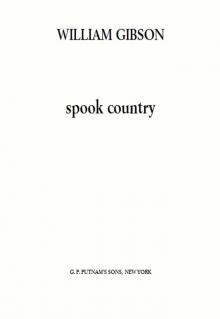 Spook Country
Spook Country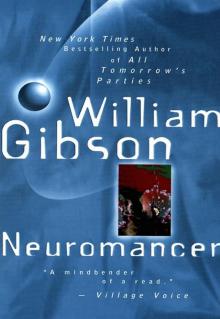 Neuromancer
Neuromancer Skinner's Room
Skinner's Room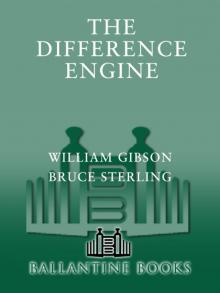 The Difference Engine
The Difference Engine Mona Lisa Overdrive
Mona Lisa Overdrive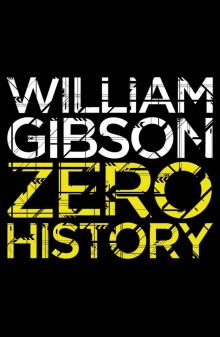 Zero History
Zero History The Peripheral
The Peripheral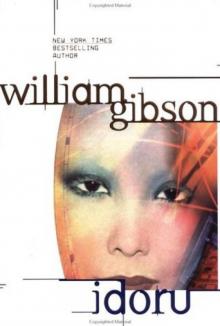 Idoru
Idoru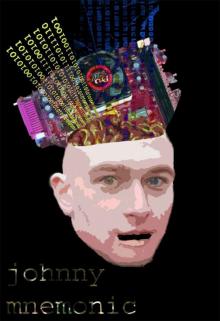 Johnny Mnemonic
Johnny Mnemonic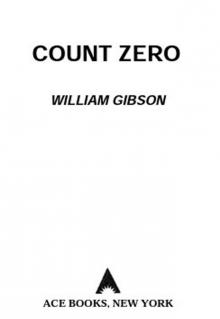 Count Zero
Count Zero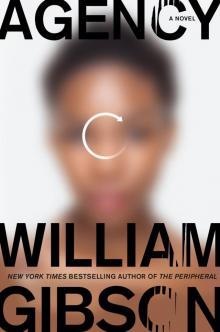 Agency
Agency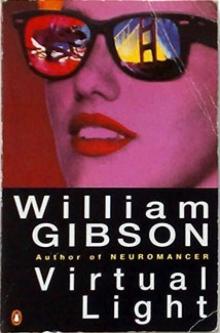 Virtual Light
Virtual Light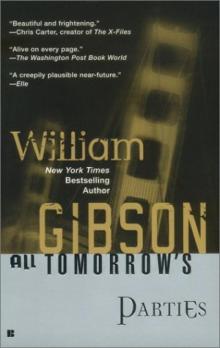 All Tomorrow's Parties
All Tomorrow's Parties The Miracle Worker
The Miracle Worker Disneyland with the Death Penalty
Disneyland with the Death Penalty Idoru tb-2
Idoru tb-2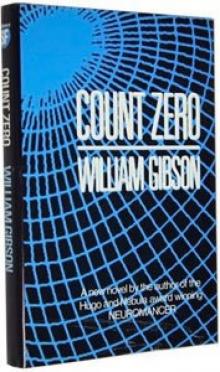 Count Zero s-2
Count Zero s-2 The Gernsback Continuum
The Gernsback Continuum New Rose hotel (tales)
New Rose hotel (tales)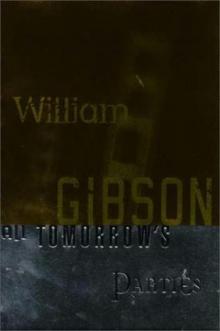 All Tomorrow's Parties bt-3
All Tomorrow's Parties bt-3 Hinterlands
Hinterlands Thirteen Views Of A Cardboard City
Thirteen Views Of A Cardboard City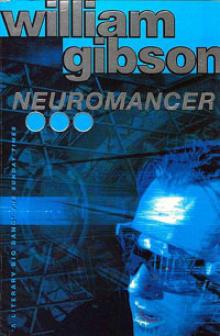 Neuromancer ts-1
Neuromancer ts-1 Virtual light b-1
Virtual light b-1